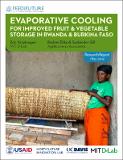| dc.contributor.author | Verploegen, Eric | |
| dc.contributor.author | Ekka, Rashmi | |
| dc.contributor.author | Gurbinder, Gill | |
| dc.date.accessioned | 2019-07-10T23:51:58Z | |
| dc.date.available | 2019-07-10T23:51:58Z | |
| dc.date.issued | 2019-05 | |
| dc.identifier.uri | https://hdl.handle.net/1721.1/121582 | |
| dc.description.abstract | The horticulture sector plays a vital role in supporting human nutrition and income generation for farmers in Rwanda and Burkina Faso. A lack of affordable and effective postharvest fruit and vegetable storage solutions often leads to spoilage, loss of income, reduced access to nutritious foods, and significant amounts of time spent traveling to sell and purchase fresh produce (fruits and vegetables), particularly in rural communities. Studies conducted in Rwanda and Burkina Faso indicate that postharvest losses for perishable products like tomatoes are between 50-60%.
The objective of this research study is to investigate the potential for non-electric evaporative cooling devices to address challenges of postharvest fruit and vegetable storage in Rwanda and Burkina Faso. The two classes of devices evaluated in this study are commonly known as “Zero Energy Cooling Chambers” (ZECCs), which are generally used by horticulture farmers, farmer groups and cooperatives, and “clay pot coolers,” which are generally used in households. These devices rely on the evaporation of water to create a cooling effect, and their performance is significantly affected by the ambient temperature and humidity of the environment in which they operate.
In this study, we used a combination of electronic sensors, fruit and vegetable shelf life measurements, and structured user interviews to gather information about users’ needs for improved postharvest storage, current methods of postharvest storage, and the performance of the evaporative cooling devices. | en_US |
| dc.language.iso | en_US | en_US |
| dc.publisher | D-Lab | en_US |
| dc.rights | Attribution-NonCommercial-ShareAlike 3.0 United States | * |
| dc.rights.uri | http://creativecommons.org/licenses/by-nc-sa/3.0/us/ | * |
| dc.subject | vegetables, postharvest, postharvest storage, off-grid energy, rwanda, burkina faso | en_US |
| dc.title | Evaporative Cooling for Improved Vegetable and Fruit Storage in Rwanda and Burkina Faso | en_US |
| dc.type | Technical Report | en_US |
| dc.identifier.citation | Verploegen, E., Ekka, R., Gill, G. (2019). Evaporative Cooling for Improved Fruit and Vegetable Storage in Rwanda and Burkina Faso. Copyright © Massachusetts Institute of Technology (Accessed on [insert date]). | en_US |
| dc.contributor.department | Massachusetts Institute of Technology. Device Research Laboratory | |

